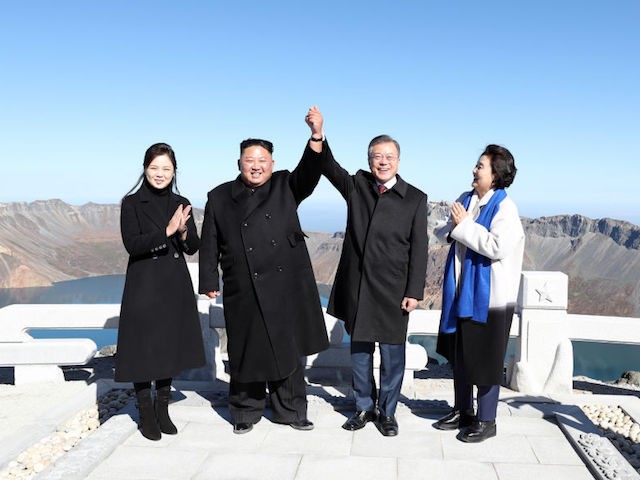South Korean Foreign Minister Kang Kyung-wha told lawmakers on Wednesday the administration of President Moon Jae-in is considering proposals to lift sanctions against North Korea as a reward for improved relations on the peninsula.
Such a move could put Moon at odds with the United States, which wishes to keep all sanctions in place until North Korea takes irreversible and verifiable steps toward denuclearization.
Yonhap News reported on Wednesday the sanctions in question were imposed after North Korea torpedoed the South Korean warship Cheonan in 2010, killing dozens of South Korean sailors and precipitating one of the worst diplomatic crises since the Korean War armistice in 1953.
The Cheonan sanctions were exceptionally tough, predating comparably severe U.N. sanctions against North Korea’s nuclear program by several years. Foreign Minister Kang noted there are many other South Korean sanctions overlapping the U.N. measures, so lifting the Cheonan sanctions would not necessarily weaken the overall punitive environment against North Korea to a “substantive” degree.
Kang also said there is no imminent “pan-governmental” decision about lifting sanctions on the table.
“There’s a need to review it with resilience in the level of not damaging the framework of sanctions on North Korea on the basis that dialogue on denuclearization and an improvement in South-North relations is proceeding,” she said, hedging her bets with equivocating language the South Korean opposition derided as bureaucratic nonsense.
The opposition’s bottom line is that no concessions on the Cheonan sanctions should be made until North Korea formally apologizes for sinking the ship. “The government should first appeal to the bereaved families for their understanding,” advised opposition lawmaker Chung Jin-seok.
The New York Times noted some South Koreans believe they sacrificed too much economic leverage with North Korea by cutting almost all trade ties in 2010, while others worry Moon would open a rift with the United States by unilaterally cutting any sanctions and establishing a principle of reciprocity Pyongyang would certainly exploit.
The Associated Press spotted a little tension between Seoul and Washington in Kang’s remarks to parliament:
The fast pace in inter-Korean engagement appears to have created a level of unease in Washington, which insists that efforts to improve relations between the Koreas should move in tandem with efforts to denuclearize the North.
Kang also said Wednesday that U.S. Secretary of State Mike Pompeo expressed displeasure over the military agreement between the Koreas. Kang did not specify what Pompeo was unhappy about, but said he asked “multiple questions” about the agreement’s content. Kang’s comments are likely to fuel speculation that Washington wasn’t fully on board before Seoul signed the agreement.
Despite meeting Moon three times and holding a summit with U.S. President Donald Trump in June, Kim has yet to provide a convincing sign that he’s ready to deal away his nuclear weapons, which he may see as his strongest guarantee of survival. Pompeo recently visited Kim in Pyongyang in an effort to set up another summit between him and Trump following months of friction in lower-level talks that saw North Korea accuse Washington of “gangster-like” demands on denuclearization.
There is also the question of whether North Korea would be pleased or irritated by symbolic sanctions relief from Seoul that has virtually no practical impact on the North Korea economy.
Another complication is that sanctions could hinder the joint economic projects Moon wants to begin with North Korea. Many such endeavors would be clearly impossible under South Korean law with the 2010 restrictions in place, and some could violate U.N. sanctions even if the South Korea restrictions are lifted.
The immediate objective of the Moon administration appears to be jump-starting tourism with North Korea, but analysts told the Associated Press that Seoul can only lift the restrictions forbidding travel across the border, while U.N. sanctions would continue restricting the movement of money in a way that would make tourism very difficult.

COMMENTS
Please let us know if you're having issues with commenting.